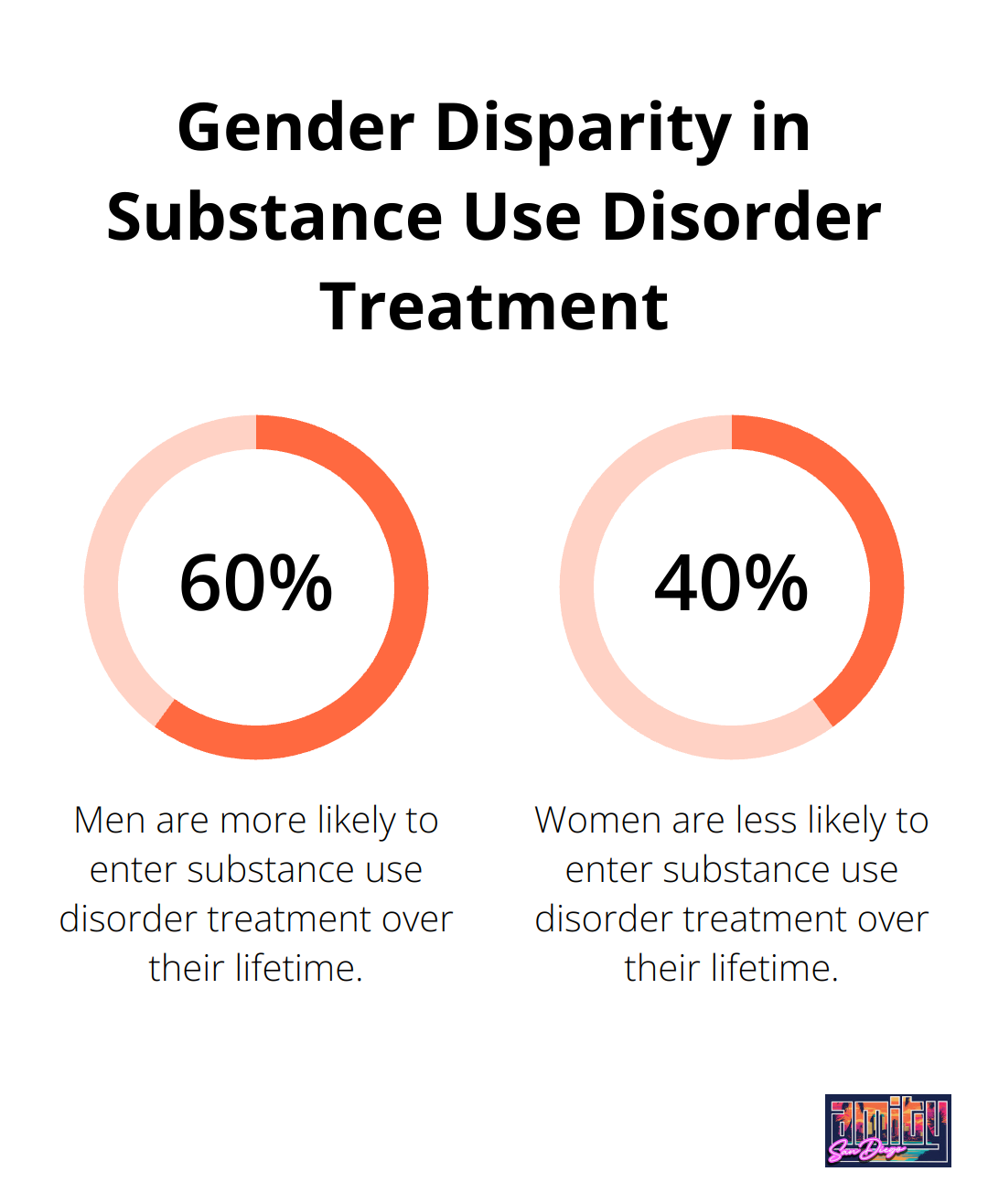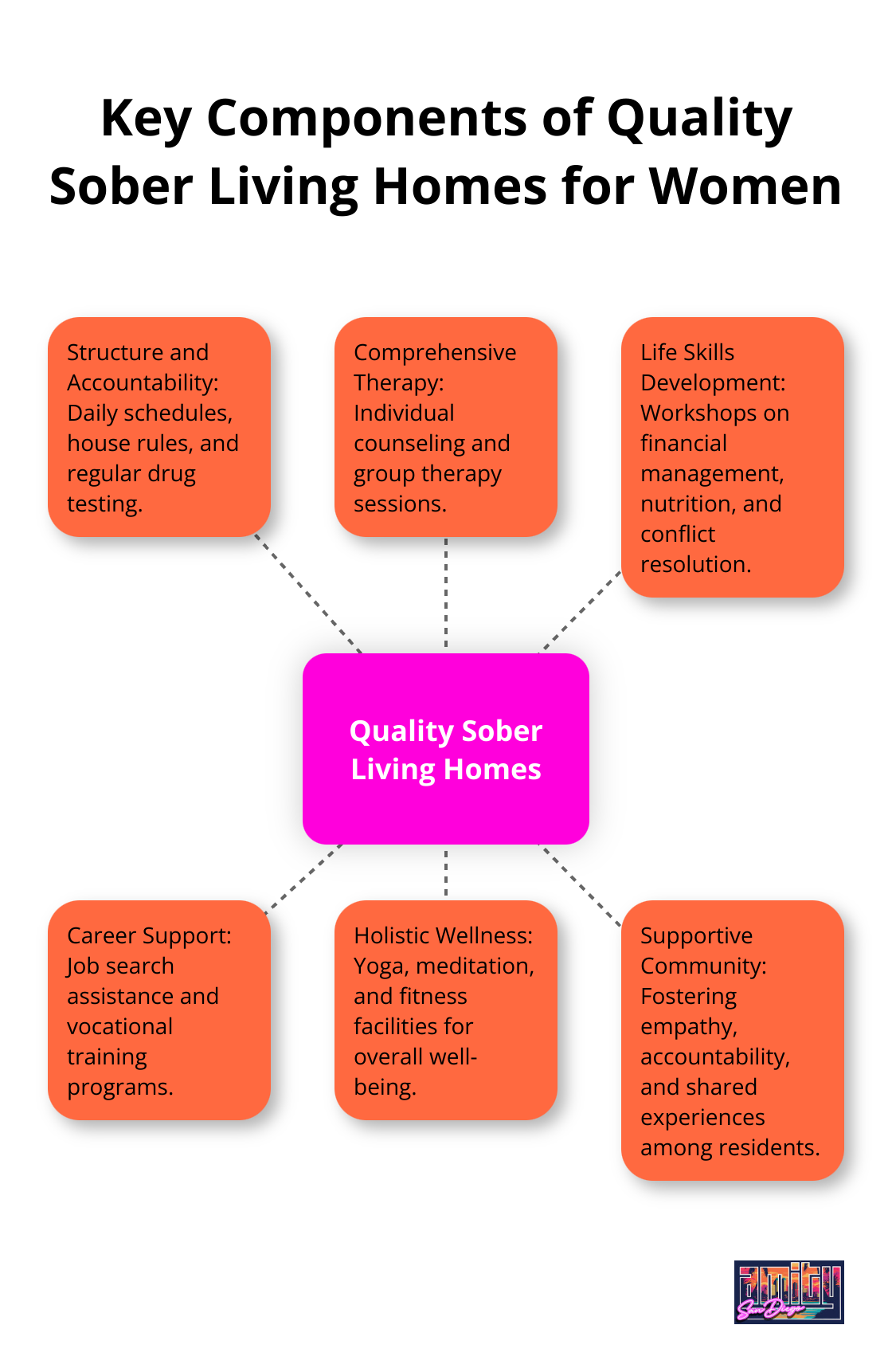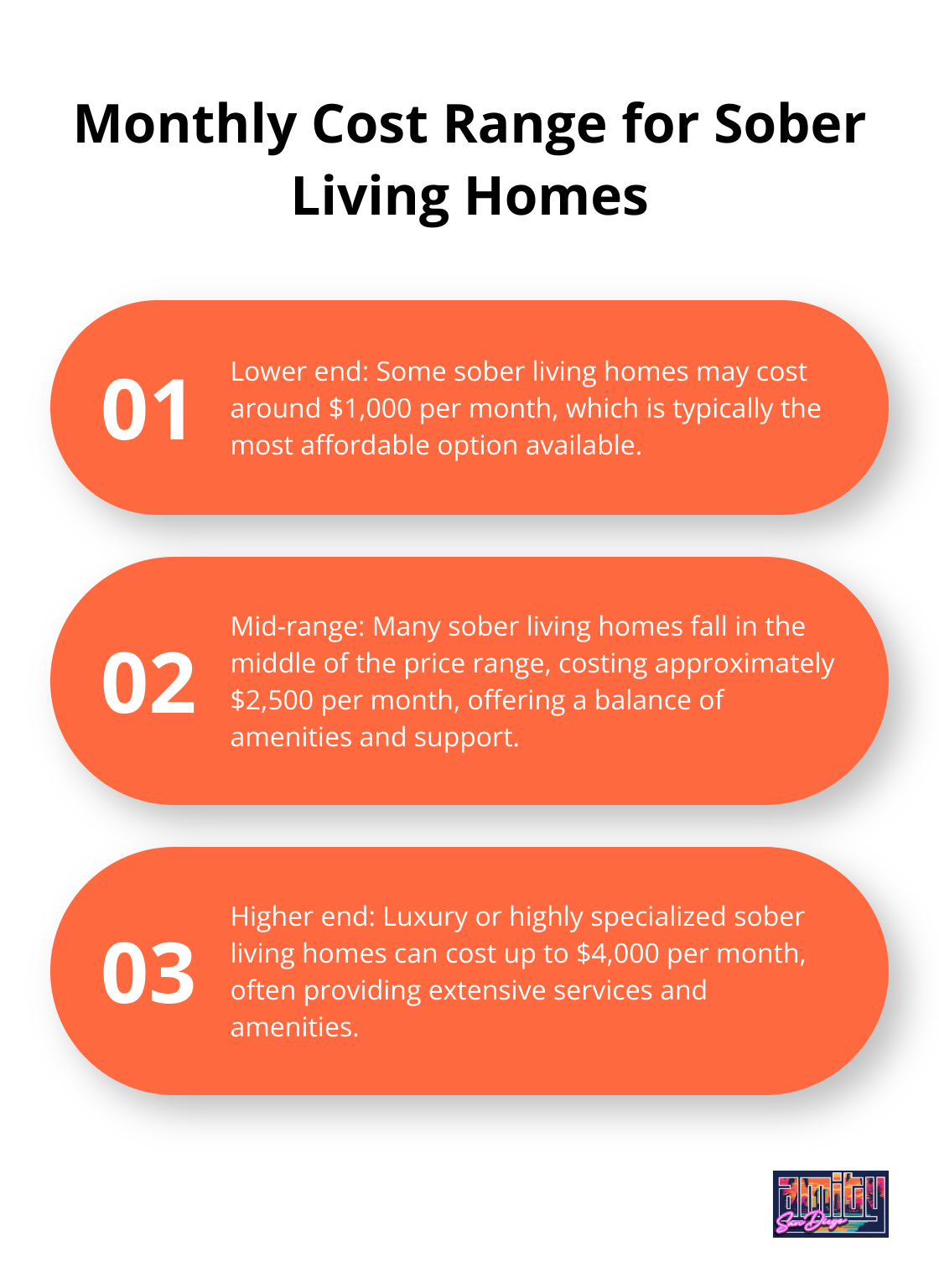At Amity San Diego, we understand the unique challenges women face in recovery. Sober living homes for women offer a vital sanctuary for those seeking lasting sobriety.
These gender-specific environments provide a safe space to address women’s distinct needs and foster strong, supportive relationships among residents.
In this post, we’ll explore the benefits of women-only sober living homes and guide you through choosing the right one for your recovery journey.
Why Women-Only Sober Living Homes Work
At Amity San Diego, we witness the transformative power of women-only sober living homes. These specialized environments address the unique challenges women face, creating a foundation for lasting sobriety.
A Safe Haven for Gender-Specific Healing
Women often confront distinct issues in addiction and recovery. These can include trauma from sexual abuse, domestic violence, or societal pressures. In women-only sober living homes, residents find a safe space to open up about these experiences without fear of judgment or misunderstanding.
Gender-specific treatment programs have shown that women with substance use disorders are less likely, over the lifetime, to enter treatment compared to their male counterparts. This underscores the importance of tailored approaches in addiction recovery.

Building Stronger Bonds
The impact of peer support in recovery cannot be overstated. Women-only sober living homes foster deep connections among residents who share similar experiences. These bonds often extend beyond the recovery period, creating lifelong friendships and support networks.
Focused Recovery Without Distractions
Romantic entanglements can derail recovery efforts. Women-only sober living homes eliminate this potential distraction, allowing residents to focus entirely on their healing journey. This environment reduces triggers and promotes a sense of sisterhood that’s essential for early recovery.
Tailored Programming for Women’s Needs
Women-only sober living homes offer specialized programs that address female-specific concerns. These might include:
- Body image workshops
- Parenting classes for mothers in recovery
- Career development tailored to women re-entering the workforce
- Nutrition and wellness programs addressing women’s health
These targeted approaches significantly boost recovery outcomes. They equip women with the tools they need to navigate sobriety in the real world.
The Power of a Supportive Community
In women-only sober living homes, residents often find a unique blend of empathy and accountability. This supportive community can:
- Encourage open communication about sensitive topics
- Provide mutual understanding of gender-specific challenges
- Foster a sense of belonging and shared purpose
- Create opportunities for mentorship and role modeling
The strength of this community often becomes a cornerstone of long-term recovery, extending well beyond the walls of the sober living home.
Women-only sober living homes provide a unique blend of safety, support, and specialized care. They create an environment where women can focus on their recovery, build lasting relationships, and develop the skills needed for long-term sobriety. As we explore the key features of quality sober living homes for women in the next section, you’ll gain a deeper understanding of what to look for in these recovery sanctuaries.
What Makes a Quality Sober Living Home for Women?
At Amity San Diego, we know that the right environment plays a vital role in recovery. Quality sober living homes for women offer more than just accommodation – they provide a foundation for lasting sobriety. Let’s explore the key elements that distinguish exceptional sober living homes.

Structure and Accountability
A well-run sober living home strikes a balance between structure and personal freedom. Residents follow a daily schedule that includes set wake-up times, meal preparation, house meetings, and curfews. These routines help women rebuild healthy habits and time management skills.
House rules form another critical component. They typically include:
- Zero tolerance for drug and alcohol use
- Mandatory attendance at recovery meetings (AA or NA)
- Completion of assigned chores
- Respect for other residents and staff
Quality sober living homes implement regular drug and alcohol testing. This accountability measure maintains a safe, substance-free environment for all residents.
Comprehensive Therapy and Support
Top-tier sober living homes provide access to vital therapeutic services. Individual counseling sessions allow women to address personal challenges with a trained professional. Group therapy fosters peer support and shared learning experiences.
Many homes partner with local outpatient programs or have on-site clinicians. This ensures residents receive consistent care throughout their stay. Trauma-informed approaches benefit many women in recovery who have experienced trauma.
Life Skills Development
Recovery extends beyond sobriety – it involves building a fulfilling life. Quality sober living homes offer life skills training to prepare women for independent living. This may include:
- Financial management workshops
- Nutrition and cooking classes
- Time management and organization skills
- Conflict resolution techniques
Educational opportunities often complement these offerings. Some homes provide GED preparation or partner with local colleges for continuing education.
Career Support
Securing stable employment marks a crucial step in recovery. The best sober living homes offer job search assistance and career development support. This might include:
- Resume writing workshops
- Interview practice sessions
- Connections to local employers who support recovery
- Guidance on disclosing recovery status in professional settings
Some homes even maintain relationships with temp agencies or offer on-site vocational training programs.
Holistic Wellness Focus
Recovery involves healing the whole person – mind, body, and spirit. Quality sober living homes incorporate holistic wellness practices into their programs (e.g., yoga, meditation, fitness facilities). These activities promote physical health and provide healthy coping mechanisms and stress relief techniques.
As we move forward, we’ll explore how to choose the right sober living home that aligns with your unique recovery needs and goals.
How to Find Your Ideal Sober Living Home
Selecting the right sober living home is a key step in your recovery journey. At Amity San Diego, we’ve observed how the right environment can transform lives. Here’s what you should consider when choosing your recovery sanctuary.
Location Matters
The location of your sober living home can significantly impact your recovery. Look for a home that’s close to your support network (family, friends, or preferred 12-step meetings). Research has repeatedly found that those with stronger social support networks remain in treatment longer, and have better recovery outcomes.
Consider the neighborhood as well. A peaceful, trigger-free environment can help reduce stress and minimize relapse risks. Some women find that relocating to a new area, away from old haunts and negative influences, provides a fresh start.
Staff Expertise is Essential
The qualifications and experience of the staff can make or break your sober living experience. Look for homes with certified addiction specialists, licensed therapists, and staff members who have personal recovery experience. These professionals provide invaluable guidance and support.
Ask about staff-to-resident ratios. Lower ratios often mean more personalized attention.
Services and Amenities
Quality sober living homes offer more than just a bed. Look for homes that provide:
- Regular drug and alcohol testing
- Individual and group therapy sessions
- Life skills workshops
- Job search assistance
- Nutritional guidance
Some homes offer holistic therapies such as yoga or art therapy (powerful tools in your recovery toolkit).
Financial Considerations
Cost is often a major factor in choosing a sober living home. Sober living homes vary in cost, generally from $1,000 to $4,000 monthly in areas like Los Angeles. The price depends on location, amenities, and the type of services offered. Don’t let cost deter you – many homes offer sliding scale fees or accept insurance.

Ask about any hidden fees or additional costs upfront. Some homes require residents to pay for their own food or transportation (expenses that can add up quickly).
Success Rates and Alumni Feedback
Try to find homes that can provide concrete data on their success rates. A reputable home should be able to share statistics on how many of their residents maintain sobriety after leaving.
Alumni testimonials can offer valuable insights into the day-to-day experience of living in the home. Ask if you can speak with current or former residents to get a firsthand account.
The right sober living home can provide the foundation for lasting recovery. Take your time, ask questions, and trust your instincts when making this important decision.
Final Thoughts
Sober living homes for women provide a sanctuary for recovery. These gender-specific environments address unique challenges, foster strong bonds, and offer tailored programming. Women-only sober living homes create a foundation for long-term sobriety by combining safety, support, and specialized care.
Quality sober living homes offer structure, accountability, therapy, and life skills development. They bridge the gap between intensive treatment and independent living, allowing women to practice new skills in a supportive setting. The right environment plays a vital role in recovery and can transform lives.
We at Amity San Diego understand the power of the right recovery environment. Our outpatient programs combine evidence-based treatments with personalized care to empower women. If you want to take the next step in your recovery journey, explore the options available to you (including supportive, women-focused sober living environments).



